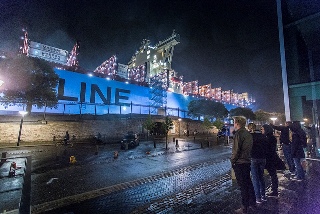 The P3 mega-alliance may have been scuttled by China’s regulators, but the rejection will probably not stop the P3 partner-carriers from looking at their other options for reducing costs, according to Drewry Maritime Research.
The P3 mega-alliance may have been scuttled by China’s regulators, but the rejection will probably not stop the P3 partner-carriers from looking at their other options for reducing costs, according to Drewry Maritime Research.
In its latest analysis, Drewry said Maersk, Mediterranean Shipping Co. (MSC), and CMA CGM will likely explore other ways to consolidate and reduce capacity and costs on the East-West trades after China’s Ministry of Commerce slammed the doors on their proposed cooperation.
China made the block on the grounds that the alliance would infringe on the country’s competition laws, since the lines’ combined market share between Asia and Europe would rise to 46.7 percent.
“Whatever they decide to do next, Maersk, MSC and CMA CGM will not be able to save the hundreds of millions of dollars a year envisaged through P3’s greater economies of scale, which explains why Maersk’s shares plummeted 8 percent just after China’s announcement, wiping $3.5bn off the company’s market value in a day,” said Drewry.
Nonetheless, it believes the P3 collapse is not a complete disaster for the world’s three biggest container shipping companies. “Maersk and CMA CGM are already industry unit cost and profit leaders without P3, and will continue to outperform others in this respect. MSC’s financial results are not published, so it is not possible to say if they are in the same position, but it is probably similar.”
The research group predicts that the three carriers will go back to the drawing board and review their other cost-cutting models.
They might be allowed to continue their numerous existing bilateral and tri-lateral vessel-sharing agreements and slot-exchange agreements on the trans-Pacific and Asia-Europe routes. They might even be allowed to form a tri-lateral consortium in the trans-Pacific, as their current 20 percent market share of effective eastbound vessel capacity to the West Coast alone is well below the G6’s 34 percent.
“This would enable them to deploy surplus ULCVs from the Asia/Europe trade lane on the route, and cascade the displaced vessels into other services, which may well have been envisaged at the outset of P3,” said Drewry.
They might also, since the U.S. Federal Maritime Commission and the European Commission have not blocked the alliance, decide to implement joint services on the trans-Atlantic route, as planned, even without a P3 global setup.
“As the Atlantic is such a low-volume route, merged operations in this trade would provide little consolation to the three carriers, however,” said Drewry.
Another solution might be the greater use of pendulum services to fill their new 18,000-TEU ships. “This will be particularly challenging to Maersk between Asia and Northern Europe, and to MSC between Asia and the Mediterranean, due to their lack of partners,” said Drewry.
On the other hand, news of the P3’s disbandment “will be good for their competitors and ports, despite not stopping the three from working together in other areas,” said Drewry.
For carrier competitors, including the Chinese lines, the cancellation of P3 removes the threat of a very powerful mega-alliance. But the overall carrier industry will have to struggle harder to control capacity than if P3 had been approved, stated Drewry.
For shippers, it means that Maersk, MSC, and CMA CGM will continue to provide separate services, thus retaining the same product differentiation. The carrier industry will remain fragmented and the prospect of dealing with just a few carriers (one each from each of the three mega-alliances) will not happen for now.
For ports and terminals, P3 was seen as both a risk and an opportunity. A risk because the alliance could have leveraged its huge volume to dominate commercial negotiations with terminals, even though it assured U.S. regulators that terminal contracts would not be negotiated jointly. It also presented an opportunity because new business could be won by those with the necessary resources.
Said Drewry: “The cancellation of P3 will probably postpone the stabilisation of the over-supplied and unprofitable carrier industry, but the further development of mega-alliances will not stop here.”
Photo: News Oresund





